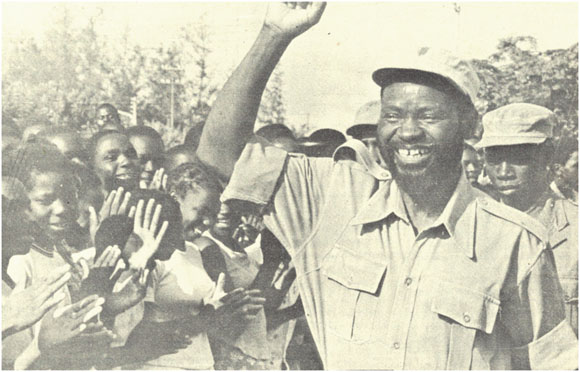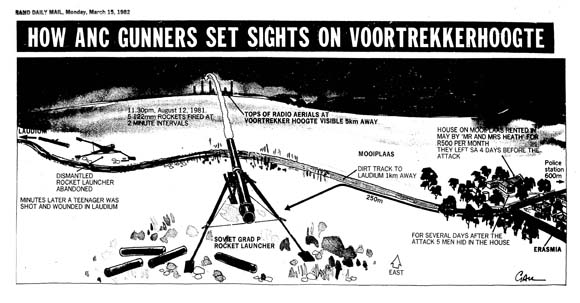Mozambique's International
Relations with South Africa
Dossiers MZ-0148 and MZ-0007, part 3
![]()
![]()
3. South African Aggression
towards Mozambique, 1982

Above: Samora Machel greeting a crowd of supporters. Machel was implacable in his support for the liberation struggles in Zimbabwe and South Africa, at considerable cost to Mozambique both economically and in terms of human lives.
The pattern of direct South African aggression against Mozambique continued throughout the whole of 1982, at the same time as Pretoria’s support for the MNR/RENAMO dissidents continued. The rebel movement, originally set up and encouraged by the Rhodesians, had been quietly transferred to South Africa at the time of Zimbabwean independence and re-established in the Phalaborwa military base. Despite evidence to the contrary, the South Africans maintained a façade of denial of any involvement in the group’s activities.
On 16 July 1983, in a feature article in the prestigious conservative British weekly The Economist entitled “Destabilisation in Southern Africa”, Simon Jenkins wrote that
In the past two years, South Africa's foreign policy has entered a new and aggressive period … The United States and Europe have lost most of their leverage over Pretoria. The black front-line states to the north fear military and economic destabilisation.
Later in the same article, Jenkins refers to several meetings between the Mozambicans and South Africans at Komatipoort, where
… the South Africans promised to stop supporting the MNR in return for the expulsion of ANC personnel from Maputo. It is unlikely that the SADF will honour its side of this bargain, though it may temporarily halt cross-border assistance. In Mozambique, South Africa appears, under intense American pressure, to have accepted the Frelimo devil it knows for the time being, while allowing the armed forces to stage occasional shows of force … Continued aggression (or the encouragement of internal rebellion) risks attracting more substantial support … Pik Botha has warned the government in Maputo that Cuban troops in Mozambique would simply "not be tolerated". Yet the state security council appears to be recklessly willing just such a confrontation. It is all tactics and no strategy.
South African or South African-inspired attacks during the year included sabotage of the Beira pipeline, airspace violations of various kinds (33 in the first six months of the year), minor armed border clashes between troops of the two sides, the deployment of mercenaries, including black soldiers. An incident with a South African fishing boat in February resulted in a fine and the confiscation of the catch: the security implications of this violation of Mozambique’s territorial waters were never spelled out, but such incursions continued throughout the period of the 1980s, and Mozambique’s capacity to respond to them was extremely limited.

Above: A diagram published by the Rand Daily Mail purporting to show how the ANC launched rockets at the Voortrekkerhoogte air force base in August 1981. The newspaper published detailed reports alleging involvement in the preparations for the attack by non-South African white visitors, based in Maputo.
MHN Resources
Consolidated Downloadable Zipped Files
Click on the yellow folder image below to download a zipped file of the third of a series of dossiers on South Africa-Mozambique relations. The archive covers the year 1982, and contains 47 documents. New items will be added from time to time: this edition of the dossier is dated 16 December 2021.
![]()



![Aluka: Struggles for Freedom [subscription required] Struggles for Freedom](imgs/aluka_200.png)


